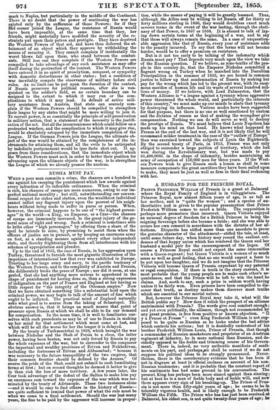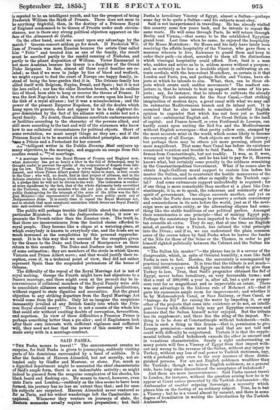I HUSBAND FOR THE PRINCESS ROYAL
Pm-Nen FREDERICK Wrizasi of Prussia is a guest at Balmoral where the Royal Family of England is in villeggiatura. The Princess Royal, now almost fifteen years of age, is as tall as her mother, and is "quite the woman " ; and a species of an- thoritative nod is given to the popular presumption that Prince Frederick William comes to court a bride. The supposition is perhaps more premature than incorrect. Queen Victoria enjoyed an unusual degree of freedom for a British Princess in being the reigning Sovereign before she became a bride ; and she was able to secure her own consent in accordance with the dictates of her af-. fections. Etiquette has stifled more than one anecdote to prove the genuine character of the attachment—stifled the tale, at least, until some future day, when history may record the earliest evi- dences of that happy union which has rendered the Queen and her husband a model pair for the encouragement of the lieges. Of course a Princess Royal could not expect the same immunities with a Queen-regnant ; but Queen Victoria is a woman of so much sense as well as good feeling, that no one would expect a force to be put upon her daughter, and we do not imagine that the Princess Victoria will become Queen of Prussia expectant by any paternal or regal compulsion. If there is truth in the story current, it is most probable that the young people are to make each other's ac- quaintance, and that the Prince will be left to win the hand he claims. And, Booth to say, such a prize is seldom worth having unless it be fairly won. Even princes have been compelled to dis- cover that truth, as destiny makes them discover moat truths which are essential to our mortal nature.
But, however the Princess Royal may take it, what will the British public say ? How does it relish the prospect of an alliance matrimonial with Prussia ? The words give cool comfort enough; and yet even politically, the alliance, though not recommended by any great promise, is free from positive or known objection. "fl y a Prusse et Prusse " : even King Frederick William is not sup- posed to be quite so Russian as he looks under the bad advice which controls his actions; but it is decidedly understood of his brother Frederick William Louis, Prince of Prussia, that though a commander of Russian musketeers and proprietor of an Austrian regiment of infantry, he is more national than Russian, and de- cidedly opposed to the feeble and trimming course of his Govern- ment. There is, indeed, no very authentic manifesto of senti- ments on his part, and perhapassve shall be correct if we do not suppose his political ideas to be strongly pronounced. Never- theless, there is the corroboratory evidence that he has been if not in disgrace at least in official coolness on account of his non- Russian tendencies; and it is probable that the constant report of his sentiments has had some ground in his conversation. The present King has perhaps been more sinned against than sinning; but at best he is a man of feeble body and of feeble will, and now there appears every sign of his breaking-up. The Prince of Prus- sia is not more than fifty-eight years of age ; he seems to be in tolerably vigorous health, and is likely enough to be Frederick William the Fifth. The Prince who has has just been received at Balmoral, his eldest son, is not quite twenty-four years of age; he
is reputed to be an intelligent youth, and has the prospect of being Frederick William the Sixth of Prussia. There does not seem to be anything frightful, then, in the destiny of a Princess Royal of England condemned to be Queen of Prussia under such circum- stances, nor is there any strong political objection apparent on the face of the Almanach de Gotha.
On the other hand, could we count upon any advantage by the match ? Queens-consort seldom go for much. If Frederick Wil- liam of Prussia was more Russian because the astute Czar called him " Fritz " and treated him as one of the family, the result must be ascribed partly to the candid cunning of Nicholas, and partly to the pliant disposition of William. Victor Emmanuel is not more Austrian because his Queen is a daughter of the Grand Dace Reignier. In fact, almost all these royal families are re- lated; so that if we were to judge by ties of blood and wedlock, we might expect to find the court of Europe one happy family, in- stead of being the bear-garden that it is. The Orleans family has allied itself with Belgium, Naples, Brazil, and Spain ; but it is not the less exiled; nor has the elder Bourbon branch, with its endless ties of blood, been able to keep or recover the throne of France. It was the first Napoleon's idea to rivet the crown upon his head by the link of a royal alliance ; but it was a miscalculation ; and the power of the present Emperor Napoleon, for all the doubts which hung upon its genesis does not appear to be in the slightest de- gree diminished by the fact of his alliance with a noble but not a royal family. No doubt, these alliances constitute embarrassments or facilities according to the character of the persons allied, and still more according to the tact and will of the statesmen who know how to use collateral circumstances for political objects. Short of some revolution, we must accept things as they are ; and if the Princess Royal is to be married on established principles, she must -3.4size a Prince and a Protestant for her consort.
A-ntelligent writer in the Dublin Evening Mail conjures up many objections, to the marriage, and suggests an escape from this routine round o ibtal couplings.
"A marriage between the Royal Houses of Prussia and England now, when Autocracy has got so heavy a blow in the fall of Sebastopol, may be thought useful to prevent the spirits of the corporation of despots from fall- ing too low. This Prince of Prussia, to whom England's daughter is af- fianced, and whom Prince Albert posted thirty miles to meet, is first cousin to the Czar • who will, no doubt, find in that project of alliance, and in the delicate attention to his feelings which makes the time chosen for revealing it, a pledge that he will not be driven to the wall. The indication is render- ed more significant by the fact, that of the whole diplomatic body accredited to the Tuileries, the only member who did not join in the ceremonial of public thanksgiving for the triumph of the arms of the Allies was the Bel- gian Minister—the representative of England's most politic uncle and of Independance Beige. It is surely time to repeal the Royal Marriage Act, and to abolish that most unnatural restriction which forces our Royal Family into anti-national alliances."
The public will perhaps trouble itself little about the absence of particular Ministers. As to the Independence Beige, it now re.- presents the French rather than the Russian view. The truth is, that there are inconveniences from the limited choice afforded to royal people. They become like a clique at a watering-Wine, at which everybody is known to everybody else, and the feud ll are as much increased as the complicities by this personal rapproche- ment. It is in this way that we account for the reception given by the Queen to the Duke and Duchess of Montpensier on their return to this country. The Duke and Duchess are both persons of some estimation; they are members of the circle in which Queen Victoria and Prince Albert move ; and that would justify their re- ception, even if in a technical point of view, they did not rather represent Spain than the suspended pretensions of the house of Orleans.
The difficulty of the repeal of the Royal Marriage Act is not of royal making. George the Fourth might have had objections to a Sussex marriage, and there might even at the present day be in- conveniences if collateral members of the Royal Family were able to consolidate alliances according to their personal predilections, without regard to state dignities and necessities. But the grand objection to any striking departure from the Royal Marriage Act would come from the public. Only let us imagine the suspicions incessantly levelled at any British family into which the Prin- cess Royal should marry ! There is not a cousin of the whole kin that could stir without exciting doubts of corruption, favouritism, and nepotism. In view of these difficulties a Prussian Prince is perhaps something better than a pis eller ; and if Englishmen look after their own interests with sufficient vigilance and sufficient will, they need not fear that the power of this country will be made away with in a marriage-contract.



























 Previous page
Previous page